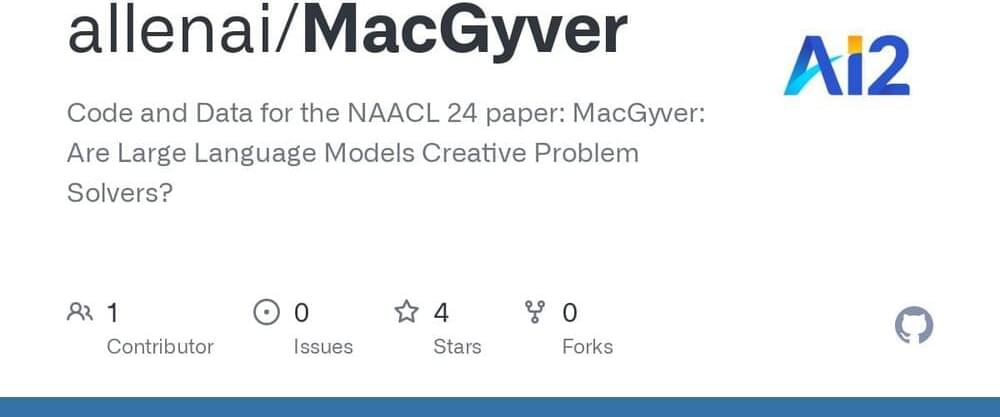Category: robotics/AI – Page 702

MacGyver: Are Large Language Models Creative Problem Solvers?
💡Can LLMs like GPT-4 reason creatively?
On #AI and #creativity.
📝Paper: https://arxiv.org/pdf/2311.09682.pdf 🛠️Code and Data: https://github.com/allenai/MacGyver.
🚀 Introducing a new playground for everyday #innovation and physical #reasoning —we collect problems to trigger…
Code and Data for the NAACL 24 paper:

Researchers Design Foundation AI Models for Use in Pathology
Artificial intelligence is poised to transform the practice of medicine through the design and deployment of AI models that can detect, diagnose, and render prognosis for a disease more rapidly than most human physicians can, and with similar or superior accuracy.
So-called foundation models — trained on vast amounts of unlabeled data and usable in multiple clinical contexts for different purposes with minimal tweaking — offer a particularly tantalizing promise to reshape diagnosis and treatment.


Explained: AlterEgo—a Device With Which You Can Communicate With Machines With The ‘internet In Your Head’
This article is almost a year old, yet still wildly interesting.
An MIT scientist developed a wearable BCI device that allows users to access the internet with their minds.
The wearable device records neural signals as and when a person hears or thinks of words.
Arnav Kapur, an India-born MIT student, has invented a device which can let you converse with machines and AI without speech, simply by ‘articulating words internally’

Google Pushing Its Unsafe Search AI on Users Who Didn’t Opt In
Don’t want Google’s experimental AI search feature embedded into your search pages? Too bad.
According to Search Engine Land, Google has started unleashing its AI-powered Search Generative Experience (SGE) product, which was previously available for users only on an opt-in basis, into the browsers of users who didn’t choose to partake in Google’s AI search experiment.
Google has defended the unsolicited SGE-ification of its platform, telling Search Engine Land that it’s thus far only incorporated SGE automatically into a “subset of queries” that take up a “small percentage of search traffic in the US” and arguing further that the rollout will allow them to glean feedback from the users who, again, didn’t elect to opt into the generative AI search service.

Acclaimed Movie Secretly Contained AI Generated Imagery
A movie released to critical acclaim has now been met with intense backlash after fans discovered it included AI-generated images.
Written and directed by siblings Cameron and Colin Cairnes, “Late Night With the Devil,” is a horror movie starring David Dastmalchian as a 70s talk show host. Through found footage, it shows a once “lost” live TV broadcast on Halloween, in which the evening’s guest, a young girl, claims to be demonically possessed.
Critics and audiences alike have raved about the movie since it premiered at the SXSW film festival — but that goodwill proved to be short-lived. In a scathing and now viral review shared on Letterboxd, a user called out the movie for having AI “all over” certain sequences, garnering thousands of likes and inciting tons of fiery discourse on other social media platforms.

Survey reveals almost half of all managers aim to replace workers with AI, could use it to lower wages
A hot potato: A lot of companies try to assuage fears that employees will lose their jobs to AI by assuring them they’ll be working alongside the tech, thereby improving efficiency and making their duties less tedious. That claim feels less convincing in light of a new survey that found 41% of managers said they are hoping to replace workers with cheaper AI tools in 2024.
A report by Beautiful.ai, which makes AI-powered presentation software, surveyed over 3,000 managers about AI tools in the workplace, how they’re being implemented, and what impact they believe these technologies will have.
The headline takeaway is that 41% of managers said they are hoping that they can replace employees with cheaper AI tools in 2024. This backs up previous reports that looked at potential jobs losses caused by generative AI, including one from September that predicted the technology would replace over 2 million US jobs by 2030. An earlier study claimed that generative AI could affect 300 million jobs globally.

OpenAI Let Directors Make Short Films With Sora and the Results Are Wild
OpenAI has given a number of directors, production companies, and creative agencies early access to its Sora text-to-video generator — and the results range from astonishing to downright terrifying.
Toronto-based multimedia production company Shy Kids used the next-generation generative AI tool to come up with a whimsical short film about “Air Head,” a man who has a balloon instead of a head.
The short film is an impressive example of the tech’s capabilities, showing off Sora’s striking ability to generate relatively believable and photorealistic video footage in response to a text prompt.
